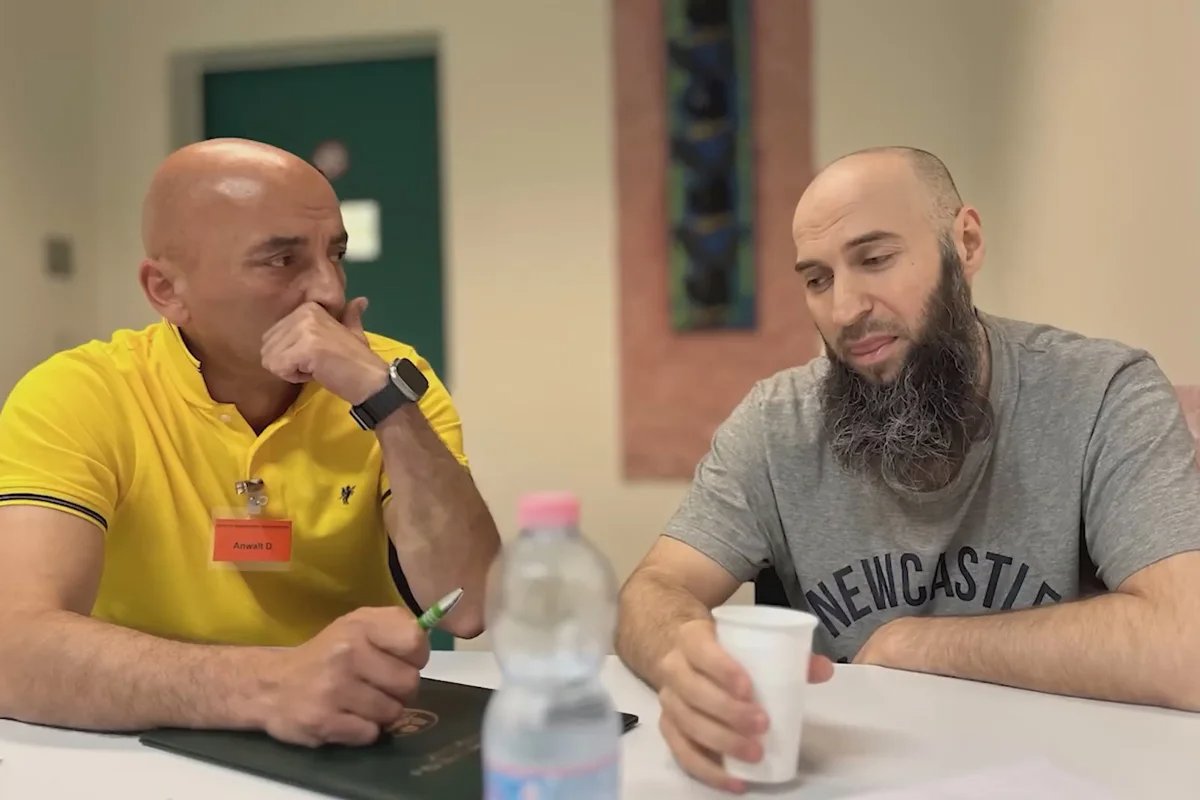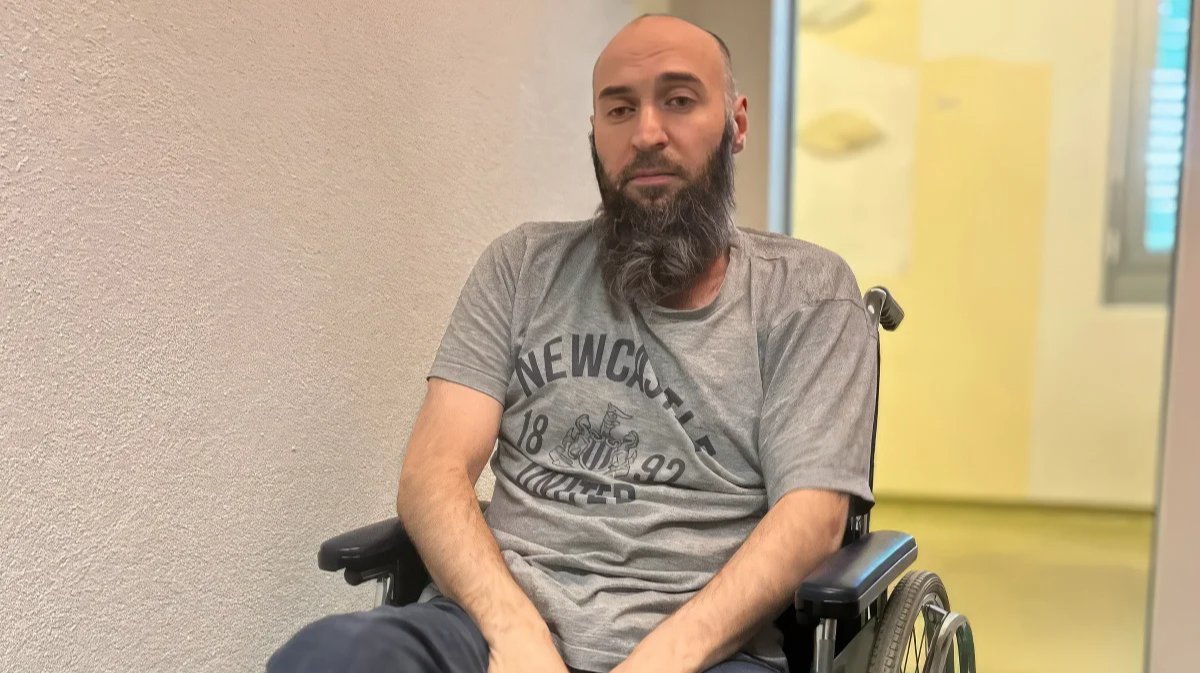Ethnic Chechen Ali Batayev, who has spent the past year in a Swiss jail awaiting deportation to Russia despite having committed no crime, is understandably frustrated by the indifference to his fate shown by the Swiss authorities, not least when he discovered his appeal against being forcibly repatriated had been rejected on the grounds that “the human rights situation in Chechnya is steadily improving”.
Novaya-Europe first shared Batayev’s story in August, at which point he was two months into a hunger strike to protest his treatment. Batayev left his repressive Chechen homeland in 2005 and settled down in Ukraine where he went on to marry a local woman and went into business. When Ukrainian bank accounts belonging to Russian citizens were frozen after the start of the full-scale Russian invasion of Ukraine, Batayev and his wife Olha agreed that he should leave Ukraine and find work in Europe as a truck driver, something he had previous experience of and was licenced to do. Batayev preferred not to be supported by his wife, and both of them wanted to be able to continue donating money to the Ukrainian Armed Forces.
However, upon reaching Switzerland, the country’s Secretariat for Migration denied Batayev temporary protected status and instead decided to deport him. As a Russian citizen, that meant he would be deported to Russia, where, as a critic of the Chechen leader Ramzan Kadyrov and someone who has publicly supported the Ukrainian military, he fears persecution.
He has now spent a whole year in a Swiss jail, for two months of which was on hunger strike. Swiss human rights activists have, along with his wife, appealed to every possible institution in the country, explaining how dangerous it would be for Batayev to return.
Batayev has long since withdrawn his application for temporary asylum in Switzerland, asking simply that he not be deported to Russia and that he be allowed to return to Ukraine instead.
“Every morning, after shelling, I get this irresistible urge to donate to Ukraine’s Armed Forces,” says Olha, adding that in the past she wouldn’t ever have talked about that publicly, but now she keeps every receipt for the donations she sends in her husband’s name. “I am ready to provide them as proof of his help to the Ukrainian Armed Forces even from a Swiss jail.”
Her husband sends her all the money he manages to earn to be donated to the Ukrainian army, she says, though he’s not currently being allowed to work from jail as a result of his hunger strike.
By the end of its second month in August, after countless letters to the prison administration, to the migration service, to Swiss newspapers, and even to the Swiss president, Batayev was taken to a hospital.
“I was terrified and happy at the same time, hoping that he would receive help in a hospital and end his hunger strike,” Olha recalls. But then she found out that he was taken there in a police van, even though by the 60th day of his hunger strike he could barely walk, and was dragged into the hospital upon arrival. Olha was told that they ran some tests, made Ali wait handcuffed in the corridor for the rest of the day, and then sent him back to jail. Neither the hospital, nor the jail wanted anything to do with him.
“Still, every cloud has a silver lining: this trip affected my husband gravely, he realised that no one cares whether he lives or dies, and no one plans to help him. That’s when he decided to end his hunger strike.”
In her desperation, Olga took the unusual step of sending her husband food in Switzerland from war-torn Ukraine and he ultimately emerged from the two-month-long hunger strike alive. They are both still hopeful he will be able to return to Ukraine instead of being deported to Russia.

Photo: Lachin Mamishov
Documents released by Switzerland's migration agency (SEM) and the court, make it clear that their rejection of Batayev’s appeal was based on what they believe is the improvement of the human rights situation in Chechnya.
“Today there’s no generalised violence [in Chechnya]. Parallel to the stabilisation of [the level of violence], human rights issues are also seeing positive developments. There are no more unlawful detentions carried out by Russian servicemen or Chechen security services. Above all, the number of violent disappearances and kidnappings has lessened.
According to the UN and the International Committee of the Red Cross (ICRC), there hasn’t been a humanitarian crisis in Chechnya since 2007.”
However far from reality such an analysis seems to anyone with any knowledge of contemporary Chechnya, the Swiss officials themselves have been able to cite reports making such claims by other international organisations: including the UN High Commissioner for Refugees, the International Committee of the Red Cross and Denmark’s Migration Service.
The Secretariat for Migration also pointed to freedom of movement within Russia, which, it argued, meant that Batayev would have plenty of opportunity to find a safe haven somewhere in such an enormous country. And finally, Ali’s lack of social media presence would actually lessen his risk, depriving him of an audience for any criticism of the Russian government he may have made in the past.
“When I read the stuff about the human rights situation improving in Chechnya, I almost had a heart attack,” Olha says. “It’s very difficult for me to read such things …My husband is keeping it together better in jail than I am out here. But it gets harder for him every day. A year in jail for no reason at all, how could this happen in a civilised society? A year of our health, life, plans, and hopes wasted. We’re not even appealing the asylum rejection, we’re appealing the decision to deport him, because it could cost Ali his life,” she says, adding that “war and jail is just too much”.
A few days ago, thanks to Olha, Batayev appeared on Facebook for the first time — just one more step Olha is taking to ensure her husband gets a chance to survive.
Join us in rebuilding Novaya Gazeta Europe
The Russian government has banned independent media. We were forced to leave our country in order to keep doing our job, telling our readers about what is going on Russia, Ukraine and Europe.
We will continue fighting against warfare and dictatorship. We believe that freedom of speech is the most efficient antidote against tyranny. Support us financially to help us fight for peace and freedom.
By clicking the Support button, you agree to the processing of your personal data.
To cancel a regular donation, please write to [email protected]

